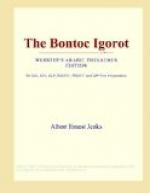Thou, Lumawig! now these children desire to unite in marriage. They wish to be blessed with many children. When they possess pigs, may they grow large. When they cultivate their palay, may it have large fruitheads. May their chickens also grow large. When they plant their beans may they spread over the ground, May they dwell quietly together in harmony. May the man’s vitality quicken the seed of the woman.
The two-day marriage ceremony of the rich is very festive. The parents kill a wild carabao, as well as chickens and pigs, and the entire pueblo comes to feast and dance. It is customary for the pueblo to have a rest day, called “fo-sog’,” following the marriage of the rich, so the entire period given to the marriage is three days. Each party to the, marriage receives some property at the time from the parents. There are no women in Bontoc pueblo who have not entered into the trial union, though all have not succeeded in reaching the ceremony of permanent marriage. However, notwithstanding all their standards and trials, there are several happy permanent marriages which have never been blessed with children. There are only two men in Bontoc who have never been married and who never entered the trial stage, and both are deaf and dumb.
Divorce
The people of Bontoc say they never knew a man and woman to separate if a child was born to the pair and it lived and they had recognized themselves married. But, as the marriage is generally prompted because a child is to be born, so an unfruitful union is generally broken in the hope that another will be more successful.
If either party desires to break the contract the other seldom objects. If they agree to separate, the woman usually remains in their dwelling and the man builds himself another. However, if either person objects, it is the other who relinquishes the dwelling — the man because he can build another and the woman because she seldom seeks separation unless she knows of a home in which she will be welcome.
Nothing in the nature of alimony, except the dwelling, is commonly given by either party to a divorce. There are two exceptions — in case a party deserts he forfeits to the other one or more rice sementeras or other property of considerable value; and, again, if the woman bore her husband a child which died he must give her a sementera if he leaves her.
The widowed
If either party to a marriage dies the other does not remarry for one year. There is no penalty enforced by the group for an earlier marriage, but the custom is firmly fixed. Should the surviving person marry within a year he would die, being killed by an anito whose business it is to punish such sacrilege. The widowed frequently remarry, as there are certain advantages in their married life. It is quite impossible for a man or woman alone to perform the entire round of Igorot labors. The hours of labor for the lone person must usually be long and tiresome.




